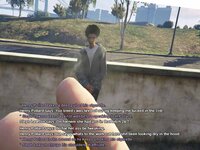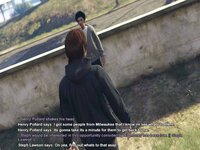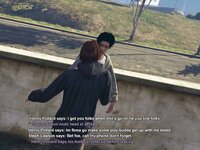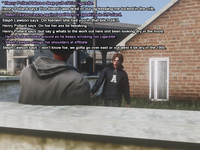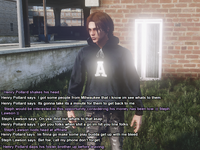104TH AND MARYLAND
MURDER MARYLAND
Risky Road is a psychotic subset of the Four Corner Hustlers (FCH) and Black Disciples (BDS). Also known as Licksquad OR BTGang these ruthless folks live on 104th and Maryland. They are named after the late member Risky Ron. This Four Corner Hustlers set consists primarily of young African Americans aged 15 to 25 from the Roseland neighborhood of Chicago, Illinois. This combination is commonly identified by throwing up the number "4" and tending to say "OnFoenem" which represents the FCH.
THE WILD HUNDREDS
Chicago was incorporated as a city in 1837. The southern section of the city was as racially diverse as the rest of the city until around the end of World War I. During this time, southern Chicago saw an influx of new black residents to areas south of 95th Street. Southern Chicago, and the
Roseland neighborhood especially, experienced racial segregation, drug and gun problems, and poverty, especially as the decline of the steel and automotive industries dried up much of the employment for the area’s residents.
The Wild 100s is a nickname for the South Side of Chicago, Illinois, specifically the Roseland neighborhood. The 100s is a mix of homes and apartments, and is interesting because of all the freight trains that go through there. Apart from that, there is a high level of urban decay in the 100s reflected in the roads & homes. By the 1980s, gang violence was rampant in neighborhoods located along and south of 100th St, (Chicago streets increase in number as you go south) earning Roseland the nickname
the Wild 100s. In 2010, Chicago police statistics listed the Roseland neighborhood along 100th Street as the most violent in all of Chicago.
4 CORNER HUSTLERS
I
n 1968, two Vice Lord adolescent males devised a plan to safeguard a specific part of the West Garfield Park neighborhood from outside invaders who endangered the neighborhood with drug peddling, gangbanging, and violence. The Four Corner Hustlers' major goal was neighborhood protection, which included not just their members but also everyone else who lived in this zone. The territory was Madison Street to the north, Jackson Boulevard to the south, Independence to the east, Pulaski Road to the west, and all the street corners in between, including Jackson and Springfield, Springfield and Adams, Springfield and Wilcox, Springfield and Monroe, Springfield and Madison; Madison and Hamlin; Monroe and Hamlin; Hamlin and Wilcox; Adams and Hamlin; Jackson and
Hamlin; Pulaski and Monroe; Pulaski and Wilcox; and Pulaski and Adams. That is a lot of territory for a new gang, but 17-year-old Walter Wheat, who had recently left the Unknown Vice Lords (born April 11, 1951), and another Vice Lord, 15-year-old Marvin Evans, made it happen. They coordinated it with another Unknown Vice Lord, 15-year-old Freddie Gage, Richard "Lefthand Goodman," Monroe "Money" Banks, and maybe seven others. Freddie Gage would become the new organization's second-in-command. Within no time, the Four Corner Hustlers flipped the West Garfield Park Unknown Vice Lords, essentially closing the chapter on the Unknown Vice Lord's Influence in West Garfield Park.
They established a fighting gang rather than a drug-dealing gang or one that damaged their own area. Instead, they planned to beat up any group who entered the building and started causing trouble. This concept was developed at the Delano playground on the junction of Springfield and Wilcox. The Four Corner Hustlers had tight standards to follow: no drug dealing, no drug use (even marijuana), no mugging, and no burglarizing, yet shoplifting and stealing from delivery trucks were perfectly allowed. Any form of violence against rival gangs was permitted, including shooting, stabbing, and breaking skulls, as long as it revealed who was running those corners.
Even though the Four Corner Hustlers were extremely aggressive and were frequently involved in truck and store robberies, they were not a well-organized conglomerate with thousands of members, as the Supreme Gangsters or Vice Lords were. The Four Corner Hustlers remained relatively small and did what they needed to do to secure their turf, hustle, and generate money without destroying the area with drugs. That was the responsibility of competitors such as the Vice Lords and the Supreme Gangsters. The Four Corner Hustlers were well-known and legendary on the west side, but they spent their early years at West Garfield Park's four corners.
NEW LEADERSHIP
Under Anglo Roberts’ leadership Four Corner Hustler popularity spread heavily to black youths living in the projects on the west side. Promises and large profits and shown more respect many black youths in
the projects now would join the Four Corner Hustlers while Angelo Roberts was able to flip groups of other gangs, primarily Gangster Stones and Vice Lord groups, to convert to Four Corner Hustlers and establish a complex crack cocaine operation in the Henry Horner projects, Rockwell Gardens projects and Maplewood Courts projects all in the Near West Side neighborhood in 1991. The Four Corner Hustlers became one of the more powerful gangs in these buildings. When the city planned to tear down the projects the Four Corner Hustlers made future plans to establish themselves on the streets of the Near West Side after the buildings were razed in the 2000s decade and this is how Four Corner Hustlers are a permanent part of the Near West Side community even if the neighborhood has become much more expensive in recent decades. Angelo Roberts also made the organization no longer a gang for just blacks, now all races could join up north and in the suburbs. This would of course grow the 4CH army numbering over 1,000 members in no time.
TAKE RISK
In contrast to many other Chicago gangs that like using the backdoor or criticizing their opportunities
on social media, Risky Roads is well-known for their deceptive, or should I say "Risky" activity. They are known for being easygoing and peaceful, yet when it comes to conducting business, they use severe brutality. Risky Roads works well with other 4CH setups, Vice Lords, and BDs. 4CH sets have a history of clashing with Gangster disciple settings. However, Risky Roads will not allow silly beef to come in the way of money. This 4CH set is constantly
outside, doing whatever they can to keep the Teeski name alive, and they are willing to go to any length to achieve success. Because the older members are locked. Up or dead Risky Roads lacks supervision and advances recklessly, causing tension among other coalitions. Risky Roads members will always choose money over all other considerations. While police have unsafe roadways under their radar, they usually maneuver in a sly but unobtrusive manner to avoid drawing notice to themselves. This set is also well-known for selling firearms and ammo to other sets in Chicago due to high gun costs.

